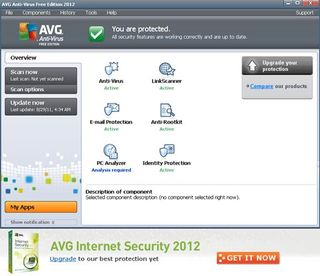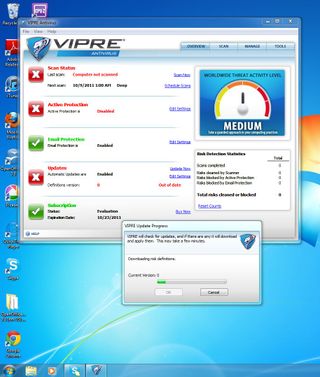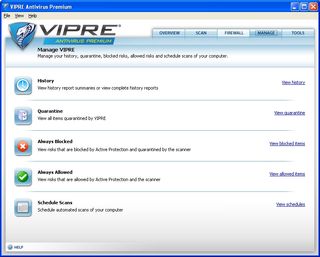Do Antivirus Suites Impact Your PC's Performance?
Most of us are now fairly confident that our antivirus scanners are doing their main job of protecting our systems from malicious pests. But what are those scanners doing to system performance behind the scenes? Are some scanners better than others?
Contenders: AVG And GFI
We felt it was important to represent a couple of the leading free AV products in our selections, and by our totally informal reckoning, AVG Free and avast! are two of the most popular. We certainly had several people in our last AV roundup request avast!. However, since that company is based in the Czech Republic and didn’t answer our press query, while AVG (located only three time zones away) bent over backward to help and participate, it made our choice simpler.
AVG Free (free.avg.com), as with most no-charge AV products, provides you with a solid antivirus core and little else in the way of free amenities. Most notably, the product lacks a firewall, so there’s no guarding inbound or outbound packet sniffing. Does it matter whether you detect a malicious before or after it reaches your system? Probably about the same as it matters if you extinguish a burning torch in your driveway instead of your hallway. You just don’t want something dangerous coming inside.
AVG Free still monitors your browsing and social networking. You’ll find a nifty tool called AVG Advice that proactively monitors Chrome, Firefox, and Internet Explorer, alerting you in the event of any “overuse of memory” by a browser. You’ll also be warned if AVG’s LinkScanner determines that a site is untrustworthy before you visit it. For $36, you can step into AVG Anti-Virus 2012 and thereby grab a firewall and priority tech support. For $49.49, AVG’s Internet Security 2012 will safeguard your wireless connections and email, as well as allegedly accelerate system start-up and rich content downloading.

GFI Vipre Antivirus (www.vipreantivirus.com/) comes to this story as our dark horse, a new contestant in our testing. Previously sold by Sunbelt before being acquired by GFI, the standard edition of Vipre covers antivirus, antispyware, email protection, and rootkit detection/removal. Vipre Premium adds in a firewall, ad blocking, Web site blocking, malicious script blocking, and more.

We can debate whether Vipre brings much that’s new to the AV space, but we definitely like having readily available phone tech support here in the U.S. Equally inviting are the product's flexible billing options. There are no auto-billing subscriptions—nice. Instead, you can select whether you want a license for one, two, or three or more systems, as well as a license duration of one, two, or three years or the PC’s lifetime. The Premium product spans from $30 for one year on one PC to $150 for lifetime support on three or more systems.

Stay On the Cutting Edge: Get the Tom's Hardware Newsletter
Get Tom's Hardware's best news and in-depth reviews, straight to your inbox.
Current page: Contenders: AVG And GFI
Prev Page Antivirus Need...and Greed Next Page Contenders: Kaspersky And McAfee-
dogman_1234 Regardless what anyone says: Using McAfee is like using a Glad garbage bag as a condom.Reply -
Martell77 I've been using Trend Micros AV since y2k and haven't had a reason to switch. Because of the systems my clients have I never recommend Norton or McAfee and if they have it I always recemmend they switch. Its truely amazing how the performance of their systems increases after getting rid of those AVs, especially Norton.Reply -
soccerdocks On the scanning time page there is an error in the second graph. It also says first run.Reply
Also, the timing of this article was excellent. I had just been doing some research about what anti-virus software I should switch to, mainly based on performance, but I guess I just got all the information I needed. -
compton Some of the results seem mysterious, like all the times the no-AV configuration scored lower in many tests than it should be faster in. Is it possible that using the Wildfire as the system drive instead of the platter would have eliminated this behavior? In general, I hope there is a second part to this that does include SSD runs. I would think any advantage AV products have vs. the no-AV config would evaporate.Reply
I stopped using AV products on my personal systems back in 2003. Norton back then was god-awful on a Pentium 4 systems, seemingly crushing the life out of a system. Even with a first generation WD Raptor 36GB my P4 2.6 would choke not only with Norton, but also McAfee. I might not use AV software, but I do put it on my family members' systems when it doesn't kill performance. In that respect these modern solutions seem much better.
-
ChiefTexas_82 On my Pentium D I have to run McAfee when I'm gone for a good while or sleeping as my computer slows to a crawl during the scan. Even bringing up the menus to stop the scan take way too long.Reply -
darkstar845 Why didn't they test this on a computer with average specs? The 8gb ram and very fast CPU might be offsetting the impact that the AVs put on the computer.Reply -
bit_user Thanks for this. I remember the bad old days when AV could make software builds take several times longer.Reply
-
cdhollan While my comment is completely tangential, but my inner chemical engineer can't resist making a small correction in what is otherwise a great article:Reply
>>Apparently, this is somewhat like saying you can boil water at 230 degrees Fahrenheit instead of 260 degrees. As long as the water is at 212 degrees or higher, no one really cares. -
rottingsheep installing vipre speeds up your computer?Reply
i think something is wrong with your numbers. -
Amazed ESET is not being tested considering it sells itself on its performance over the competition while maintaining the same levels of protection.....Reply
Most Popular

